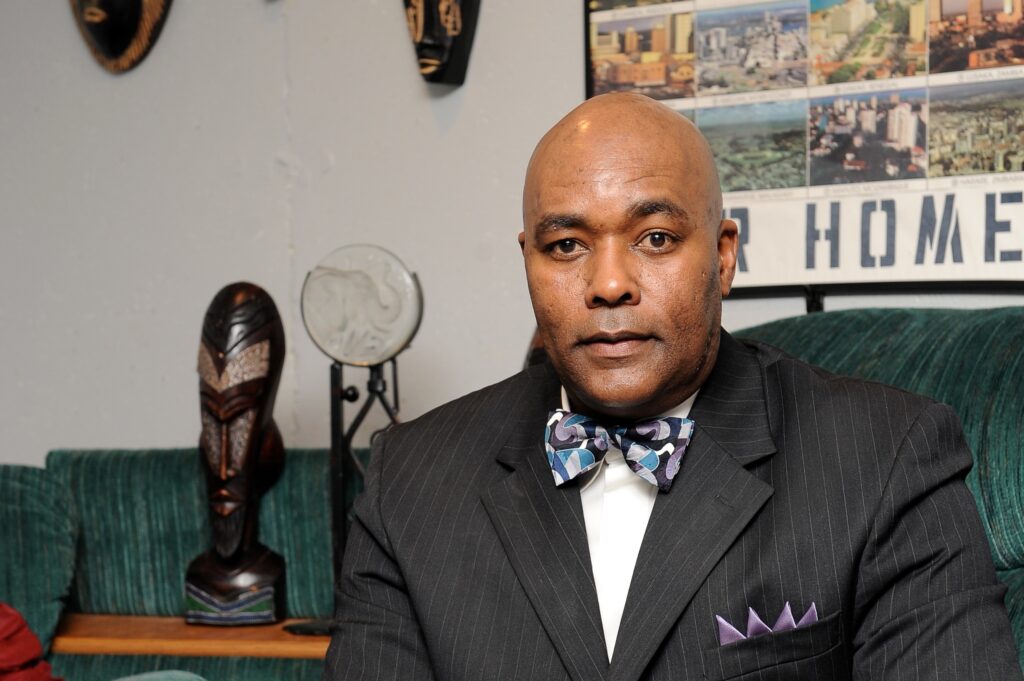Licensed psychotherapist Ajuma M. uses his life experiences and innate talents to focus on the mental health of young Black men and help them find their path through an obstacle-filled world. He is also a motivational speaker and author who has traveled the world. He learns new languages as a hobby, allowing him to deepen his global perspectives.
Becoming a role model
Ajuma grew up without a father figure in a household with five siblings. He attended both public and parochial schools before attending Central State University and earning degrees in child development and psychology.
After earning a graduate degree from the University of Missouri-St. Louis, he worked as a counselor at Harris-Stowe State University. During this time, Ajuma entered the Nation of Islam, an Islamic and Black nationalist movement that gave him pride and helped him to understand his pathway in life and talents.
While at Harris-Stowe in 1988, he started the Association of African American Role Models program in which primarily African American men and women mentored young men aged 9-19. The program started by focusing on the Laclede Town housing complex, where violence and drug activity was common. He told young men in the program, “I can’t be your father, but I can certainly be your role model.”
The group held weekly meetings, overnight retreats, and tours of historically Black colleges and universities. Guests—including Muhammad Ali—were invited to speak on topics such as employment, survival skills in a racially polarized world, and first-hand accounts of incarceration. The program grew to include young women and continued for 20 years. Ajuma says many of their members have gone on to become teachers, administrators, superintendents, and attorneys. However, he is heartbroken by those who have been lost to prison and gang violence. He says, “The nature of the beast is some will be lost, including those for whom you have the greatest aspirations, but you will save more than you lose.”
Private practice today
Ajuma has been in private practice with a focus on male development and trauma for nearly 30 years. In that time, he says the typical age of a client referred to him has shifted from early teens to pre-kindergarten age.
The arrival of the COVID pandemic changed his practice from in-home to virtual-based therapy sessions. While it’s more difficult to see environmental influences of the home on a person’s wellbeing, he says, virtual sessions help eliminate potential barriers such as weather, transportation, and childcare. Ajuma is concerned the digital world may be increasing feelings of isolation in children and creating an expectation of being entertained. He says digital tools that reduce the effort to read and write are impacting education and the social skills of young people. For example, he often gets one-word responses from his clients, making it more difficult to get to the heart of a trauma. “I have to ask them 50 questions to get one answer”, he continues, “everything is ‘Yes,’ ‘No,’ or ‘I don’t know.’”
Representation
Ajuma says therapy was a taboo subject in the Black community thirty years ago, “Most [Black] people thought therapy was for crazy White people. Now they know that therapy is for all people. It’s a viable outlet to help you maintain a sense of equilibrium given whatever you might be going through.”
Ajuma tells Black men that stress and anxiety is among their top killers and leads to an inordinate rate of prostate cancer among them. He says, “You take into consideration the stress, poor diet, lack of exercise, environmental drama, the racial polarization—all of those components—which is what we call ‘Life.’ If you’re not careful, you’re not going to be here.” Ajuma recommends daily exercise, meditation, prayer, rest, and hydration. He encourages journaling to purge troubling anxiety.
Everyone is the average of the five people they are around, Ajuma says, and people who are toxic and pull from you need to be removed. He advises clients to find five “people of influence that add value to your life and support you emotionally.”
Currently, less than five percent of psychotherapists are African American. But Ajuma points out all therapists are not the same, nor are teachers and doctors. He says it’s important to find a professional with whom you have the best connection and not simply try to match by race.
Ajuma says, “The world’s in the middle of a mental health crisis right now.” The isolation, depression, and uncertainty of the worldwide shutdown has resulted in all the problems that go with those issues: rises in suicide, domestic violence, and employment insecurity.
“All health begins with mental health. Mental health matters,” he says. To find out more about Ajuma, his books and his programs, click here.
